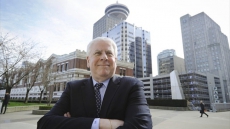TORONTO — Comprehensive screening programs that detect lung cancer early and improve patients' chances of survival are lacking across the country, says a report by Lung Cancer Canada, an advocacy and research fundraising organization.
The report, entitled "The Faces of Lung Cancer: Fighting Disease, Fighting Disparity," says lung cancer is the Canada's No. 1 cancer killer for both men and women, yet unlike breast and colon cancer, there are no provincial or national screening programs for early detection of the disease. Almost half of lung cancer diagnoses are made when the malignancy is at its most advanced stage, dramatically reducing the chance of survival.
With screening, "we predict 1,200 Canadian lives can be saved every year," said Dr. Natasha Leighl, president of Lung Cancer Canada.
"We think it's so important that provinces really move to implement lung cancer screening as quickly as possible," she said Thursday in an interview. "We really believe there is a tremendous ability here to save lives and really change the face of lung cancer and the impact that lung cancer has on Canadians every single day."
Leighl, a medical oncologist at Princess Margaret Cancer Centre in Toronto, said the U.S. Medicare program recently agreed to cover the cost of low-dose CT scans to screen for lung cancer, and private health insurers are also required to cover the test.
"Here, we've really lagged behind," she said, noting that the Canadian Partnership Against Cancer has been trying to organize a framework to help provinces set up screening programs, "but nobody has yet bitten."
The report also notes there are provincial differences in access to diagnosis, treatment and survival outcomes. One-year survival rates vary across the country, and some of these differences may be related to medical resources. P.E.I., for instance, has a severe shortage of specialists in the area, and Alberta has among the longest wait times for tumour-removing thoracic surgery in the country.
"Every Canadian should have access to the same level of care, no matter where you live," said oncologist Dr. Paul Wheatley-Price, chairman of the group's medical advisory committee.
"This means the same access to gold-standard therapies, including life-saving drugs or modern surgical and radiotherapy technologies," he said in a statement. "The reality that there are such stark differences across different provinces should be alarming to Canadians. This is simply unacceptable and something we need to change."
Despite being Canada's deadliest cancer, there is often stigma attached to having the disease. Findings from a Lung Cancer Canada survey suggest that more than one in five Canadians feels less sympathy for people with lung cancer than those with other cancers because of its link to smoking.
And when it comes to fundraising to support research, dollars earmarked for lung cancer represent less than one per cent of all private cancer donations, and the disease accounts for just seven per cent of government funding for cancer-specific research.
Yet more than 15 per cent of people who get the disease never smoked and more than 35 per cent are ex-smokers, who in many cases quit years before their diagnosis.
"I still find that I have to justify my husband's disease to others," said Natalie Deschamp of Ottawa, whose spouse has lung cancer, although he never smoked and was healthy and athletic.
"He was still running regularly when he went to the doctor for a spot at the back of his eye," she said. "It turned out to be a secondary tumour from his lung cancer. That was three years ago. He was 40 and our girls were five and seven."
By the end of 2014, an estimated 26,100 Canadians will be diagnosed with lung cancer — 13,400 men and 12,700 women. Overall, about 20,500 will die from the disease, according to the Canadian Cancer Society.
Among those who succumb to the disease will be about 9,700 women; their number will exceed the roughly 8,000 women who will die from all the other female cancers combined — breast, ovarian, uterine and cervical.
While lung cancer incidence rates in men have been declining since the mid-1980s, the annual rate of new cases among women was continuing to rise until 2006.
"We believe the explanation is that women took to smoking later than men and they've also taken to smoking cessation later than men," said Leighl. "So we've not yet seen that drop that we're hoping to see associated with women quitting smoking or woman not starting to smoke."
When it comes to never-smokers, there's also a gender difference: research shows that non-smoking women are significantly more likely to be diagnosed with lung cancer than non-smoking men, but doctors don't know why.
That has experts wondering whether there is more behind women's lung cancers than just tobacco, she said, suggesting that estrogen may play a role.
"Maybe lung cancer in women is not related just to smoking rates and quitting smoking, but something else that's going on at the biological level."





